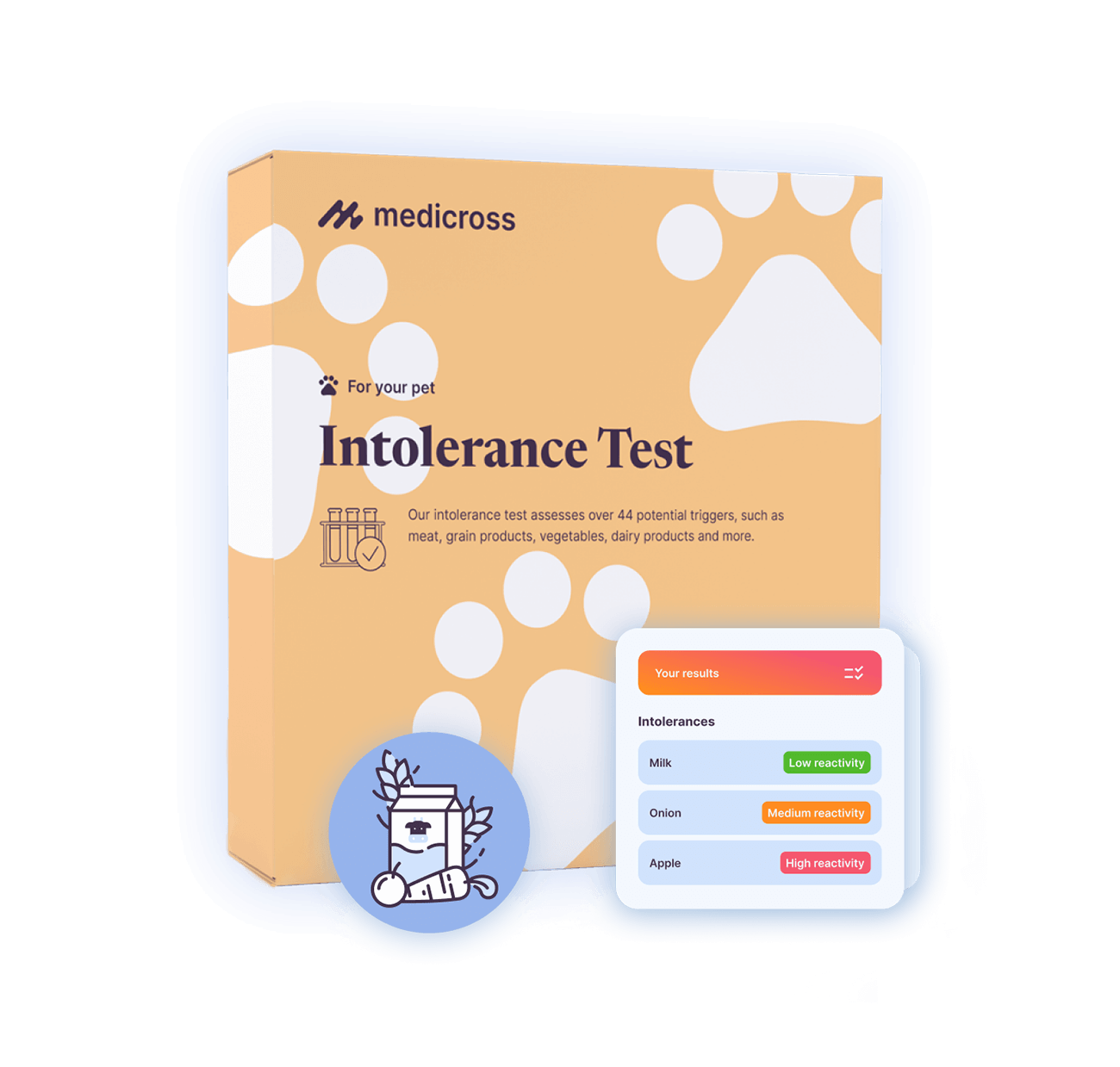Understand your pet
Your pet has a limited ability to tell you if it is experiencing bothersome symptoms or discomfort. With our tests you can get clarity if your pet suffers from possible intolerances or has a possible increased need for micronutrients.

Which animals do we test?
-
Dogs
Your faithful companion through forest and meadow

-
Horses
Your noble companion through every tournament

-
Cats
Your fluffy companion in everyday life

-
And many more!
You can test other species on request!

What can I test my animal for?
Select one of the following tests to learn more
-
When is a micronutrient test advisable?
Micronutrient test
Test nowGet clarity about your pet’s micronutrient needs and counteract complaints such as exhaustion, sleep disorders or coat problems through targeted dietary changes or food supplements.

- Easily understandable results
- Painless due to just a small coat sample
- Modern complementary medicine
Available here for petsWe test for over 70 Micronutrients
Click on a category to see a listing of the nutrients tested.
-
Amino acids
Amino acids
Amino acids are chemical compounds that can be strung together to form long chains and thus form the basic structure of proteins. They are found in all living things and are responsible for various vital functions in the human body. Part of the amino acids can be produced by the body itself and therefore they are classified as non-essential. The essential amino acids, on the other hand, are indispensable and must be taken in regularly with food.
- Creatine
- GABA
- Glycine
- Glutathione
- L-Alanine
- L-Arginine
- L-asparagine
- L-Cysteine
- L-Citrulline
- L-Phenylalanine
- L-Glutamine
- L-Histidine
- L-isoleucine
- L-Leucine
- L-lysine
- L-Methionine
- L-ornithine
- L-Proline
- L-serine
- L-Theanine
- L-threonine
- L-Tyrosine
- L-tryptophan
- L-valine
-
Vitamins & Vitaminoids
Vitamins & Vitaminoids
Vitamins are organic compounds and unlike other nutrients, vitamins do not provide energy. They are substances that the body itself cannot synthesize (with the exception of vitamin D). Therefore, they are considered essential for humans, as they must be ingested with food. Vitaminoids are vitamin-like substances that includes a number of different substances and metabolites. They were all initially assigned to the group of vitamins until it was discovered that the body can synthesize them itself. They thus belong to the conditionally essential nutrients, since in the case of illness or certain metabolic conditions, it may be possible that their own synthesis does not cover the daily requirement.
- Vit A
- Alpha Lipoic Acid
- Vit C
- Choline
- Coenzyme Q10
- Vit D
- Vit E
- Inositol
- L-Carnitine
- Taurine
- Vit B1
- Vit B10 (PABA)
- Vit B12
- Vit B15 (pangamic acid)
- Vit B2
- Vit B3
- Vit B5
- Vit B6
- Vit B7
- Vit B9
- Vit K2
-
Other
Other
This refers to defined key figures of analytical results in the laboratory. They enable physicians and therapists to classify a measurement result into normal values and abnormal values.
- Omega-3 fatty acids
- FP probiotics
- FP-Detox
-
Secondary plant substances
Secondary plant substances
Secondary plant compounds are natural chemical compounds in plants that are not essential nutrients . Nevertheless, they have a variety of positive effects on the human body and can prevent the development of various diseases such as diabetes, cardiovascular diseases, neurodegenerative diseases or even cancer.
- Astaxanthin
- Beta-carotene
- Epigallocatechin gallate (EGCG)
- Spermidine
- Quercetin
- Sulforaphane
- Lutein
- Resveratrol
- Rutin
-
Minerals
Minerals
Minerals are essential nutrients that must be ingested through food and that the human body needs for numerous functions. Minerals are divided into bulk and trace elements. Quantitative elements are present in the body in relatively large quantities, while trace elements are present only in small quantities.
- Copper
- Iron
- Calcium
- Chrome
- Zinc
- Iodine
- Potassium
- Silicon
- Magnesium
- Manganese
- Selenium
-
Enzymes
Enzymes
Enzymes are complex protein molecules that act as "accelerators" (also called biocatalysts) of biochemical reactions or metabolic processes in the human body. This means that they accelerate biochemical reactions by lowering the necessary activation energy.
- Bromelain
- Papain
- Pepsin
IronIronBeta-caroteneCalciumChromeGlutathioneSiliconLuteinTaurineVit B1What is your result?
You will receive a PDF document that lists your micronutrient needs in detail and clearly.
Your results-
-
Result
-
Vitamin CLow demand
-
ZincVery high demand
-
Vitamin DMedium demand
-
MagnesiumLow demand
-
100% The basis for a healthy pet life is vitamins and minerals, which play a crucial role alongside the main nutrient groups of proteins, fats and carbohydrates.
-
When is an intolerance test advisable?
Intolerance test
Test nowFind out which foods and substances can cause problems for your pet. This way you can alleviate symptoms caused by undetected intolerances and increase your pet’s overall well-being.

- Easily understandable results
- Painless due to just a small coat sample
- Modern complementary medicine
We test for up to 44 Intolerances
What intolerances do we test for?
-

Meat

Meat
Duck, lamb, goose, chicken, liver (lamb), liver (pork), turkey, beef, rabbit, pork (cooked), veal, liver (beef), horse,
Seafood, Fish, Salmon, Tuna -
Cereals
Cereals
Millet, corn flour, sesame, rice, yeast, oats, corn
-
Vegetables
Vegetables
Potato, beet, broccoli, zucchini, carrot, parsley
-
Legumes
Legumes
Lentil, peas, soy
-
Dairy products
Dairy products
Butter, milk, sheep milk
-
Fat
Fat
Hemp oil, coconut oil, sunflower oil
-
Much more
Much more
Egg yolk, egg white, lactose (milk sugar)
Our pet tests
A possible intolerance or need for micronutrients in pets is often directly related to the diet or the nutrients contained in the feed.
-
Micronutrient test for pets

Get clarity about your pet’s micronutrient needs and counteract complaints such as exhaustion, sleep disorders or coat problems through targeted dietary changes or food supplements.
-
Pet intolerance test

Find out which foods and substances can cause problems for your pet. This way you can alleviate symptoms caused by undetected intolerances and increase your pet’s overall well-being.
How does
the test?
- Discreet, fast process
- Painless with a small coat sample
- Easy to understand result
In 4 steps to the result
-
Step 1
Order test
Order the pet test online and print the submission sheet.
-
Step 2
Cut off small strand
Cut a small strand of fur and wrap it securely.
-
Step 3
Send fur sample
Send us the fur sample together with the entry form by mail.
-
Step 4
Result received
You will receive the result in 3 to 18 working days.













